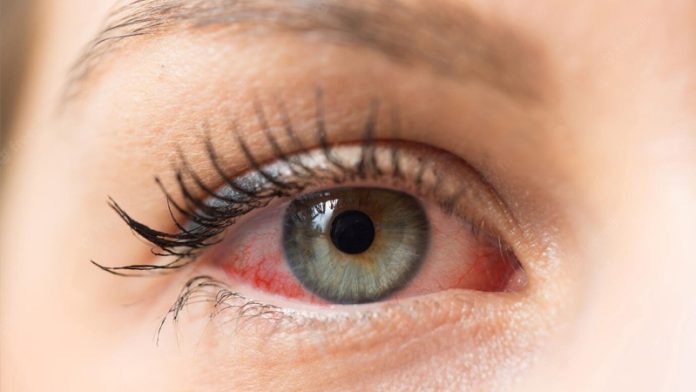
You might have heard that beauty lies in the eyes of the beholder; if you want to appreciate the beauty of Mother Nature, all you need is simply to take care of your eyes. Dry eye syndrome, or dry eye disease, has become one of the most widespread eye diseases over the past few years. And along with other eye problems, you might think, can dry eyes cause blindness? The answer is no, but if one fails to observe the symptoms of dry eye syndrome and leaves it untreated, the condition can worsen over time.
What Is Dry Eye?
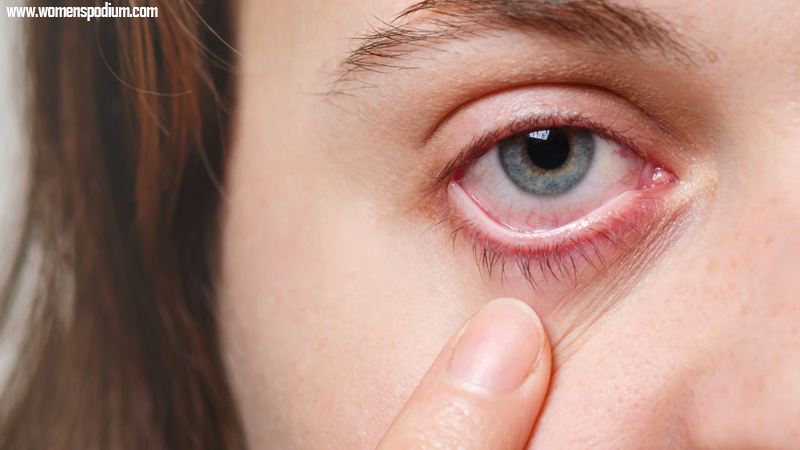
Tears are essential for the eyes; if your eyes do not produce enough tears or tears are not evenly spread over the surface of the eyes, you can suffer from a condition known as Dry Eye Syndrome.
Dry eye syndrome appears when your eyes don’t produce the desired amount of tears or there is some problem with the tear film. When we blink, tear film spreads all over the eyes and keeps the surface smooth; tear film is quite crucial for good vision. For a complete understanding, it is better to understand its function.
The tear film comprises three layers; the oily layer, the watery layer and the mucus layer.
1. The Lipid Layer
This layer lies outside the tear film; its purpose is to keep the surface of tears smooth and avoids drying up tears unnecessarily.
2. The Watery Layer
This layer lies in the central part of the tear film and significantly contributes to tear production. The watery layer serves the purpose of cleaning; it cleanses the eyes and removes undesired particles from the eyes. If any foreign particle/dust sticks to your eye surface, the aqueous layer washes it out from your eyes.
3. The Mucus Layer
The mucin layer is the innermost layer of the tear film; it stretches the watery layer all over the eyes’ surface and keeps it wet. In the absence of a mucus layer, tears cannot attach to the eyes.
What Are The Leading Causes Of Dry Eyes?
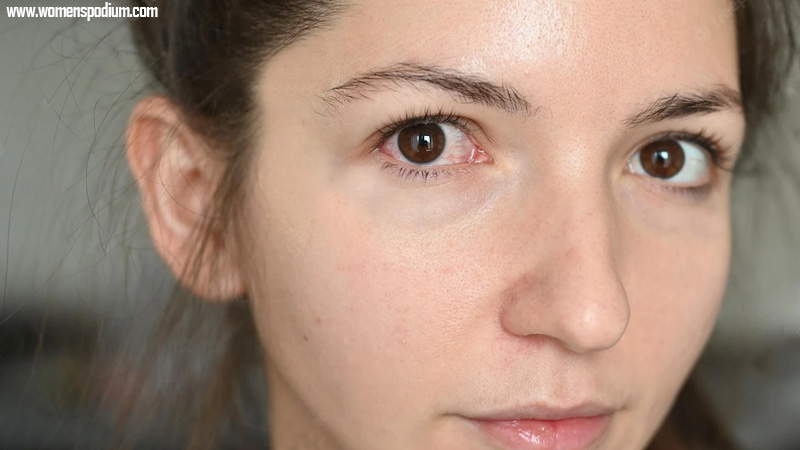
There are numerous causes of dry eyes, which vary from person to person and gender to gender.
- Age factor: People over 50 most commonly suffer from dry eye syndrome compared to young people because of changes in hormones with every passing year.
- Women at the time of menopause have more chances to suffer from dry eyes.
- People who do excessive work on the computer often complain about dry eyes; long work hours can dry up the eyes and creates sight problem for the users.
- Dry eyes can also relate to any genetic disease, e.g. diabetes, lupus, and blood pressure.
- Over-exposure to heat can also make you suffer from dry eyes.
- The side effect of medications can also cause dry eyes.
- If you live in a dry climate or are exposed to smoke daily, you are at risk of dry eye syndrome.
- If you are fond of reading and your blinking frequency is not as much as required, your eyes can develop symptoms of dry eyes.
- Bacterial infection of the eyes is also a source of dry eye syndrome.
- The contact lens can also be a reason for dry eyes; contact lens users suffer from dry eyes more often than people who wear glasses.
- Eye allergies are also the root cause of dry eyes.
- The use of sleeping pills, anti-depression medicines and medications for the heart also result in dryness of the eyes.
- Your diet and eating habits matter a lot, and if you have a deficiency of Vitamin A, you are more prone to dry eye syndrome.
What Are The Symptoms Of Dry Eye Syndrome?

- Redness of eyes
- Blur vision
- Itchy eyes
- Pain while using contact lens.
- Excessive tears/water in eyes.
- Irritation or burning of eyes.
- Over sensitivity to heat/light
If you are suffering from dry eye syndrome, your eyes produce more tears than usual. Tear ducts expand (extraordinary) and become more watery over the eye surface.
How Do You Treat Dry Eyes?
Treatment for dry eyes is related to the symptoms. When you find you have dry eyes, don’t delay; just step out and consult your ophthalmologist first, as they are the best person to guide and treat you rightly. Following are the possible treatments that your ophthalmologist can recommend depending upon your symptoms.
1. Counter Drops
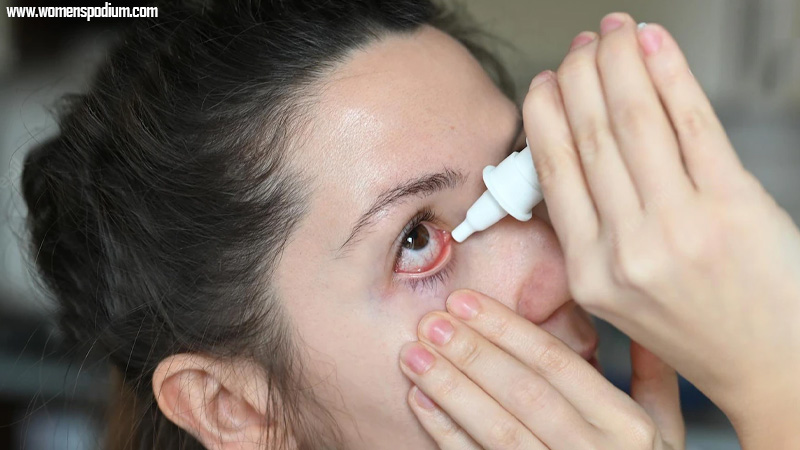
Artificial tears are tried, tested and highly recommended for the treatment of mild eye dryness. Different ointments and moisturizing gels are also available in the market. Consult your ophthalmologist for the proper guidance.
2. Prescribed Medicines

Health care providers often prescribe Cyclosporine (Restasis) and Lifitegrast (Xiidra) to treat chronic dry eye syndrome. These are eye drops that help your eyes to produce an adequate amount of tears.
3. Punctal Plugs
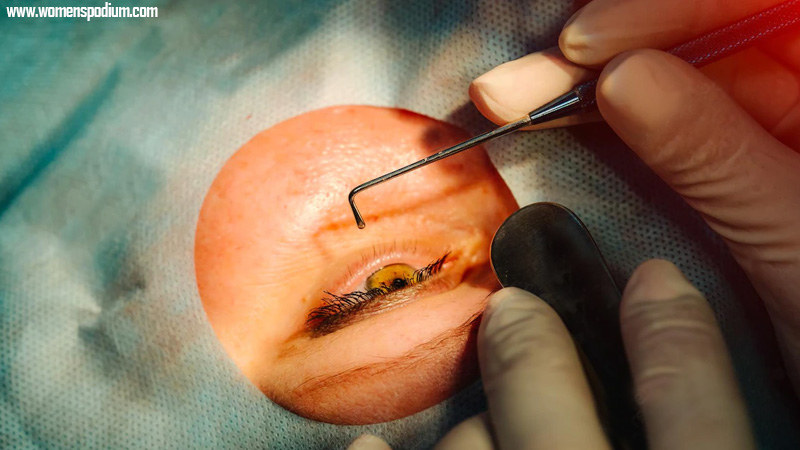
If your eyes are losing tears at an abnormal rate, punctual plugs might work for you. In this treatment, the doctor will insert special Punctal plugs/tear duct plugs in the internal corners of the eyes. Tear duct plugs keep the tear in your eyes and avoid the overflow of tears.
4. Surgery
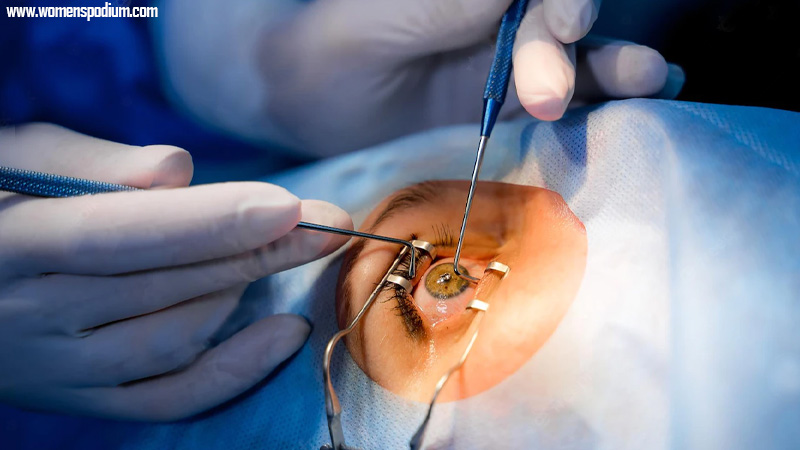
Surgery is advised for people whose eyelids become loose and cause heavy tear drainage from the eyes; in such cases, surgery is performed to fix the eyelid.
Note: Eyes are sensitive, and the above suggestions are the possible treatment that an ophthalmologist can offer you for dry eye symptoms; it is just for knowledge, so don’t try it as a DIY. Consult with an expert eye doctor.
Do Dry Eyes Go Away?
Dry eyes syndrome does not go away completely; you can avoid severe symptoms with timely treatment and prevention.
Can Dry Eyes Cause Blindness?
Dry eye syndrome leads to complications; in worst situations, dry eyes can lead to blindness. However, blindness due to dry eyes is very rare in the USA, and in other countries, dry eyes cause blindness only in those cases when primary symptoms are ignored and dry eyes are untreated.
What Can You Do To Prevent Dry Eyes Blindness?

Prevention is always better than cure. If your eyes have developed symptoms of dry eye blindness, you must consult an ophthalmologist and start using proper medication. Although prescribed medicines by your eye doctor are highly recommended, the following tips can help prevent chronic dry eye blindness.
1. Avoid direct sunlight and use sunglasses.
2. If your eyes are heat sensitive, keep a safe distance from the heater/stove.
3. Maintain an accurate distance from the computer/gadget screen; also, adjust the brightness of your computer screen. Too much brightness can cause irritation/redness, and long hours of use can lead to dry eyes.
4. Blink frequently while using gadgets to avoid dryness of the eyes.
5. Stay hydrated, and increase your water intake.
6. Use Vitamin A supplements and sleep well for around 7/8 hours.
7. Avoid using hair dryer; excessive use of hair dryer/blow dryer is also a source of dry eyes.
8. Avoid using contact lenses.
9. Use a humidifier in your house or workplace.
10. Studies and research have proved that Omega 3 fatty acid supplements are beneficial in treating dry eye syndrome.
One of the most frequently asked questions is Can dry eyes cause blindness? Every year millions of people around the world suffer from dry eye syndrome. Discuss with your ophthalmologist; sometimes dry eye syndrome is linked to some hidden unidentified body ailment (lupus). In such a situation, first of all, sort out the underlying reasons. Stay in touch with your doctor and use suitable prescribed medicines.
Also Read: Digestion is the queen of all bodily systems. Here is the list of food items that you may have missed are the foods bad for digestion.





